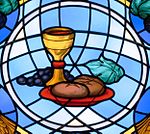| Part of a series on the |
| Eucharist |
|---|
 |
| Part of a series on |
| Eastern Christianity |
|---|
 |
The Holy Qurobo (Classical Syriac: ܩܘܽܪܳܒܳܐ ܩܰܕܝܫܳܐ, romanized: Qūrōbō Qādīśō) or Holy Qurbono (Classical Syriac: ܩܘܽܪܒܳܢܳܐ ܩܰܕܝܫܳܐ, romanized: Qurbōnō Qādīśō, the "Holy Offering" or "Holy Sacrifice" in English)[note 1] refers to the Eucharist as celebrated in Syro-Antiochene Rite (West Syriac Rite) and the liturgical books containing rubrics for its celebration. West Syriac Rite includes various descendants of the Oriental Orthodox and Eastern Catholic churches. It consists of two distinct liturgical traditions: the Maronite Rite, and the Jacobite Rite. The major Anaphora of both the traditions is the Divine Liturgy of Saint James in Syriac language. The Churches are primarily based in the Middle East, Africa, and India.
The Maronite tradition is employed solely in the Maronite Church originating from the region of modern-day Lebanon.
The Jacobite tradition is employed in the Syriac Orthodox Church[4][5] based in Syria and its Maphrianate in India known as Jacobite Syrian Christian Church, the Syriac Catholic Church based in Lebanon, the Malankara Orthodox Syrian Church, the Malabar Independent Syrian Church and the Syro-Malankara Catholic Church based in India.
A reformed variant of the latter without intercession to saints and prayers for the departed, is used by the Mar Thoma Syrian Church, a Reformed Oriental Church.[6][7]
- ^ Holy Qurbana-The Malankara Orthodox Liturgy
- ^ https://archive.org/details/jacobitesyrianch0000adai
- ^ Malankara Mar Thoma Syrian Church - The Sacrament of Holy Qurbana
- ^ "Holy Qurobo – St. George Patriarchal Cathedral – Damascus". Syrian Orthodox Patriarchate of Antioch. 2017-08-27. Retrieved 2021-03-28.
- ^ "Syrian Orthodox Patriarchate of Antioch". Syrian Orthodox Patriarchate of Antioch. Retrieved 2021-03-28.
- ^ Leustean, Lucian N. (30 May 2014). Eastern Christianity and Politics in the Twenty-First Century. Routledge. p. 568. ISBN 978-1-317-81866-3.
The Syrian Orthodox also became the target of Anglican missionary activity, as a result of which the Mar Thoma Church separated from the Orthodox in 1874, adopting the Anglican confession of faith and a reformed Syrian liturgy conforming to Protestant principles.
- ^ Office, Anglican Communion. "Anglican Communion: Churches in Communion". Anglican Communion Website.
Cite error: There are <ref group=note> tags on this page, but the references will not show without a {{reflist|group=note}} template (see the help page).
© MMXXIII Rich X Search. We shall prevail. All rights reserved. Rich X Search
